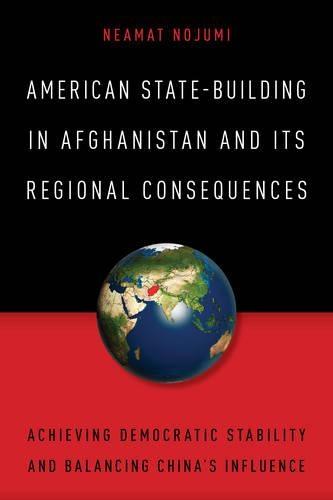
American State-Building in Afghanistan and Its Regional Consequences: Achieving Democratic Stability and Balancing China's Influence
(Hardback)
Available Formats
Publishing Details
American State-Building in Afghanistan and Its Regional Consequences: Achieving Democratic Stability and Balancing China's Influence
By (Author) Neamat Nojumi
Bloomsbury Publishing PLC
Rowman & Littlefield Publishers
17th March 2016
United States
Classifications
Professional and Scholarly
Non Fiction
Peace studies and conflict resolution
327.581
Physical Properties
Hardback
340
Width 158mm, Height 239mm, Spine 30mm
699g
Description
The book calls for rethinking U.S. policy toward promoting Afghanistan as a regional economic hub in Southwest and Central Asia as it fits within the broader national security interest of the regional states. It argues for defining Afghanistan within the U.S. national security interests in Southwest and Central Asia, including Iran, and offers critical strategic tools for Washington to support political openness and reforms that can balance China and Russia, as well as more effectively manage Irans regional behavior. It links the U.S. policy approach in Southwest and Central Asia as the missing leg of Washingtons East Asia policy. The book defines the strategic interests of each of Afghanistans neighboring states and key regional actors to explain why a rethinking of the U.S. role in Afghanistan can assist the emergence of a new regional order in Southwest and Central Asia, which in turn can embolden a free market economy and a growing political openness superior to authoritarianism and Islamist militancy.
Reviews
Dr. Nojumi has produced an expansive vision of economic success for Afghanistanembedded in regional cooperationalong with the political and policy changes necessary to achieve the vision. -- Ambassador Ronald E. Neumann, (ret.) president, American Academy of Diplomacy
Nojumi provides a remarkable account of U.S. state-building efforts in Afghanistan. Building on longstanding observations of U.S. politics Nojumis book is based on key insights in the U.S.Afghanistan strategies of the last decades. Against this background the book reveals persuasively the shortcomings of an incoherent U.S. policy towards Afghanistan. What is more, in his book Nojumi describes with foresight a picture of Afghanistans future. Moving away from the common viewpoint of US-centered politics he presents the reader with the increasingly important role of China for Afghanistan. He goes beyond the daily news, and opens the readers eyes to the greater geopolitical picture of the coming years. Considering the rising role of China in Eurasia, Nojumi predicts pivotal shifts in geopolitics. Nojumi argues convincingly that Afghanistan is becoming the birthplace of a new regional order at the crossroads of Central and South Asia. Based on deep historical and political insights, the book pays particularly attention to the economic potentials of Afghanistan, including its mineral resources and its role as a geo-strategic turnstile. The book is a must read for everyone who wants to understand the future of Afghanistan in a region, which is undergoing dramatic changes. -- Conrad Schetter, professor for Peace and Conflict Research at the University of Bonn
Few people are as well placed as Neamat Nojumi to assess the recent political development of Afghanistan, and how trajectories established under the US-led state-building efforts may lead after the withdrawal of international forces. Nojumis analysis presents a much needed corrective to the literature on state-building in Afghanistan by forcing us to return to the basics of understanding the capacity of the Afghan state, of objectively viewing the weaknesses of the Afghan economy, and of resurrecting a much-needed appreciation of the critical geopolitical location Afghanistan occupies in regional affairs. With keen insights into Afghan culture, society, and politics and with the experience of being a scholar-practioner, Nojumis work should be required reading for those interested in the process of state-building in Afghanistan, and the lessons that should be learned and remembered for any possible future interventions. -- Gareth Stansfield, Al-Qasimi Chair of Arab Gulf Studies, professor of Middle East Politics, Institute of Arab and Islamic Studies, University of Exeter, United Kingdom
Author Bio
Neamat Nojumi is affiliated with Boston University and worked with number of accredited institutions, including George Mason University, Tufts University, and Harvard University. He also worked as a senior advisor for and with the U.S. government and NATO as well as for non-governmental organizations including the United Nations, United States Institute of Peace (USIP), and Woodrow Wilson International Center for Scholars.
